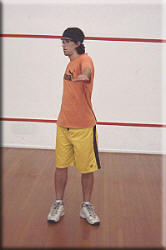Game Preparation for Squash
- Think of starting your preparation before you leave home by eating correctly and fully hydrating.
- Contrary to popular opinion the five minute “hit up” prior to your Squash game should not be solely used as a warm up.
- Use the five minute hit up to get used to the court and ball conditions.
- Make sure you have the additional total body warm up and even the Squash specific warm up
- Being well prepared will help prevent muscle and joint injuries, and get fully tuned in for your game.
Pre Game Meal
fish
lean meats bread cereals salad sandwiches cooked vegetables potatoes biscuits dessert
|
| Excellent Choices | Poor Choices |
| Breakfast Cereal or Pancakes Low Fat or Skim Milk Fruit, Fruit Juice Weak Tea or Coffee Wholemeal Toast |
Bacon and Eggs White Toast Full Cream Milk Strong Coffee |
| Lunch Lean Meat, Chicken, Cheese and Salad Sandwich Fruit Juice Fruit Salad, Ice Cream, Rice Custard |
Meat Pie and Ships Milkshake Mars Bar |
| Dinner Pasta (limit oil and cheese) Low Fat or Skim Milk Salad, Vegetables Apple Crumble, Pancakes |
Pizza, Fried Chicken, Steak Roast Potato Apple Turnover Can of Coke |
Mental Preparation
- Prepare yourself mentally to follow your desired game plan (eg. Volley where possible, change the pace, etc)
- If the level of arousal(eg. too anxious?) is too high - try deep breathing, relax and get rhythm especially in the hit up.
- Visualise your technique (eg lob serve - feet positioning, ball toss, front all target etc)
- Set/adapt your game plan according to what you know about your opponent.
- Stay focussed prior to the game (don't let pre game interaction upset or distract you)
 Squashgame Gold: Advanced Text and Video Content
Squashgame Gold: Advanced Text and Video Content
What you must do to be successful
Being successful
- Each competition presents different challenges and has different demands.
- Preparing to perform adds a sense of control.
- Relieving tension, enhancing concentration and building confidence.
- Visualise some problems you expect to encounter the day before the actual match.
- Visualise how you will successfully handle the problems to include a perfect performance.
The following ideas may assist your mental ability to perform well.
| Behaviour experienced | Suggested encounter |
| Could not sleep the night before | Relaxation exercises |
Nervous
|
|
Referee Calls
|
|
Aggressive Opponent
|
|
Over confident
|
|
A guide to your behaviour is:
- Shook hands before and after the match.
- Comments were supportive
- Accepted the Ref's decisions
- Showed honesty and courtesy
- Acknowledged good play
Physical Match Preparation
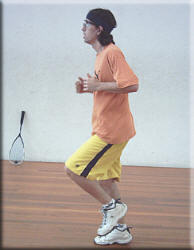
- The physical match preparation consists of three main elements.
- General body warm up
- Specific muscle stretches
- Sport specific warm up
- Undertake all three warm ups to be fully physically prepared for your match.
- Continue your mental preparation at this time to perform at your best.
More Pics...
Swing the racket through the full range of movement
Specific Muscle Stretches
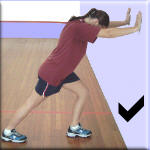
- Once a warm up has been completed, players should then stretch the major muscle groups used in Squash.
- Each stretch should be held for at least 10-20 seconds(no “bouncing”)
- Completed at least 2-4 times.
- Held until a slight burning sensation can be felt.
- Never stretch torn or injured muscles
- Read more on stretches
More on Stretches
 Squashgame Gold: Advanced Text and Video Content
Squashgame Gold: Advanced Text and Video Content
Specific Muscle Stretches
- Stretching specific muscles is essential to help reduce muscle tear injuries and to allow you to have maximum flexibility during a game.
- A warm up by itself will not prepare you for the extra stretching that is required in some situations and when you may move awkwardly.
- Stretching beforehand will help reduce the chance of muscle related injuries. Stretching after the game will help your overall flexibility as this will stretch the muscles more than the pre game stretch due to vigorous movement during the game.
- More advanced forms of stretching can be undertaken but this would normally be done in a special stretching or flexibility session.
Skills Warm Up
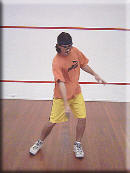
- A Squash skill warm up should include a series of ghosted court movements.
- A range of racket swings.
- A combination of the above.
- You can increase the intensity as this progresses.
- During the entire warm up, mental rehearsal or other psychological preparation for the match.
More on Squash Skills Warm up
 Squashgame Gold: Advanced Text and Video Content
Squashgame Gold: Advanced Text and Video Content
Sports Specific Warm up
- A Sport specific warm up can have a positive effect on your performance.
- It is vital prior to a competitive match .
- It can be replaced in a practice game with a short period of lower intensity play (say building up over 5 - 10 minutes).
- A period of controlled dynamic movement is very useful in peparing for a competitive game and to help reduce injury risk.
- This is also a useful time for mental rehearsal.
- Undertaking this warm up will help refine the muscle memory into a groove.
The Pre Game Hit Up
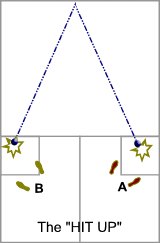
- A "hit up" before a competition match lasts 5 minutes.
- Standing on either backhand or forehand side, players hit the ball to each other for 2.5 minutes then change sides.
- This is a chance to get used to the court conditions and the ball.
- Get a feel for the pace of the ball and try to establish a good length.
- If you have not seen your opponent play before, try to pick up any technical weaknesses they might have.
- Try to get your movement and swing into a "groove" - be purposeful.
- Attempt plenty of volleys in the hit up.
- Mental rehearsal of your hit up routine can ensure that you carry out all the desired tasks in the hit up.
Support Squashgame
Support us here at Squashgame.info! If you think we helped you, please consider our Squash Shop when purchasing or make a small contribution.

